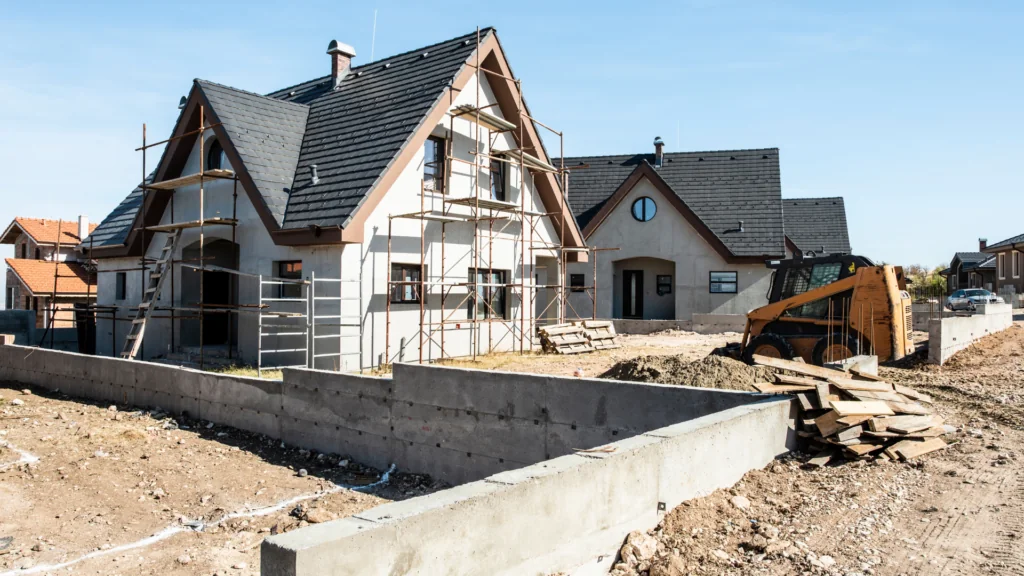- What is Construction Financing?
- How Does It Work?
- What Kinds of Construction Loans Are There?
- Eligibility Criteria for a Construction Loan
- How to Apply for a Construction Loan
- Construction Loans vs Standard Mortgages
- Construction Loan Interest Rates Explained
- Who Offers Construction Loans?
- How To Choose the Best Construction Financing for Your UK Project?
- The Bottom Line
How To Fund A UK Build With Construction Financing: A Guide

If you’re in the UK and thinking about diving into a construction project, you’ve probably noticed that costs are going up.
Way up.
Since 2020, we’ve all felt the pinch of rising material prices, labour shortages, and even the cost of the land itself.
These challenges, intensified by COVID-19 disruptions, a dwindling pool of skilled workers, and inflation, have driven the annual growth rate for construction costs to nearly 10% in 2022.
So, how do you fund your project without breaking the bank? Construction financing might be your answer.
In this guide, you’ll learn everything you need to know about securing the right financial support for your project. You’ll understand the basics, find out the different steps involved, and learn how to choose the best one of these loans.
What is Construction Financing?
Construction financing is a targeted financial solution specifically tailored to cover the wide-ranging expenses associated with building or renovating properties.
This type of loan is versatile and can be employed for various aspects of a construction project, ensuring your work progresses smoothly without financial hitches.
A construction loan isn’t restricted to bricks and mortar; it’s far more versatile. You can use it to finance:
- Land acquisition
- Existing properties for redevelopment
- Necessary permits and planning applications
- Construction materials
- Labour costs
- External professional services, like architects and engineers
How Does It Work?
In the UK, construction financing works as a short-term loan, typically lasting between 12 to 18 months. The loan amount one can secure usually ranges from 50%-60% of the land’s purchase price.
However, some lenders may offer up to 100% of the construction costs, provided the total amount doesn’t surpass 60-75% of the project’s estimated final value. Funds are disbursed in stages, in alignment with predefined construction milestones.
It’s essential to note that the terms, interest rates, and fees associated with construction loans are not permanent; they are often negotiated on a case-by-case basis.
This variability makes it crucial for you to shop around for a loan arrangement that best suits your project’s financial needs.
Once the construction project is complete, the loan is typically repaid by either selling the completed property or by remortgaging it through a standard mortgage.
This provides builders and developers with the financial flexibility they need to cover the array of upfront costs integral to a construction project.
What Kinds of Construction Loans Are There?
If you’re scratching your head over construction financing options in the UK, worry not. Here’s a rundown of the different loans you might consider:
Construction-Only Loans
Ideal for both commercial and residential ventures.
These loans can cover the cost of the land, as well as the purchase of an existing building. Your responsibility is to pay back the loan after the project is complete, either by selling the property or opting for a traditional mortgage.
Construction-to-Permanent Loans
Ideal for residential and commercial projects but especially popular for home building.
This loan not only pays for land and construction costs but also converts into a permanent mortgage once the project is complete. The one-time fee setup can make it more economical than a construction-only loan.
Owner-Builder Loans
Ideal for residential projects.
This loan type is only available to you if you’re a licensed builder and covers the cost of land and construction. Repayment options are flexible, allowing you to either sell or convert the loan into a traditional mortgage.
Renovation Loans
Ideal for commercial and residential upgrades.
For smaller tasks, a business or personal credit card may suffice. For bigger undertakings, a mix of asset finance, an unsecured business loan, and a construction-only loan could be the right choice.
Eligibility Criteria for a Construction Loan
While lender requirements can differ, you’ll generally be assessed on the following:
- Credit Score. A solid credit score is a big plus, but not an absolute necessity. Even if you’ve been turned down before, you might still get the loan you need.
- Income and Cash Flow. You need to show you can handle fees and repayments until you’ve paid back the loan, either by selling the property or refinancing it.
- Deposit. A deposit of at least 25% of the total project cost is usually expected.
- Project Details. Your project plan needs to be thorough. This should include the property deed, design blueprints, a realistic budget, a drawdown proposal with clear milestones, and contracts with approved suppliers.
- Exit Plan. You should have a plan for repaying the loan. If you intend to refinance with a commercial or residential mortgage, some lenders might ask for a pre-approval letter.
How to Apply for a Construction Loan
The application process is rigorous, involving:
- Submission of your project’s business plan and your financial standing.
- The lender’s scrutiny of the information you’ve provided, along with standard credit checks.
- If successful at this point, you’ll receive an agreement in principle.
- The lender will visit the site and conduct an independent valuation.
- Once cleared, you’ll get the final loan terms, and contracts will be exchanged.
- The first payment will then be disbursed.
Construction Loans vs Standard Mortgages
Construction loans and standard mortgages are like apples and oranges.
Construction loans are short-term, generally no more than a year. Standard mortgages, on the other hand, are long-term commitments ranging from 15 to 30 years.
With a standard mortgage, your payments cover both principal and interest, right away.
While your construction project is in progress, you’ll usually only make interest payments. And, yes, these loans do have higher interest rates than your standard loans, given they’re seen as riskier for lenders.
Construction Loan Interest Rates Explained
When it comes to construction loans, you only pay interest on the funds that have been disbursed. This means you’ll start off paying a smaller amount in the early phases of your project.
As your build progresses and more money gets released, your monthly interest payments will gradually increase.
The loan gets squared away entirely at the project’s conclusion. You can do this either by selling the completed property or by converting the construction loan into a traditional mortgage.
It’s also crucial to know that the interest rates on construction loans are usually variable. This means they can fluctuate according to the prime rate or other financial indexes they’re linked to.
Your initial interest rate will be determined by several factors, including your credit score and financial background.
So, while your first few payments might be on the lighter side, be prepared for them to ramp up as your project moves forward and additional funds are disbursed.
Who Offers Construction Loans?
When you’re planning a construction project, one of the first steps is securing the right financing. There are various lenders out there offering construction loans, each with its own set of terms and conditions.
The following is a snapshot of some potential lenders you might look into, but keep in mind this list isn’t comprehensive:
- Aldermore. Known for strong customer support, Aldermore requires a minimum annual turnover of £250,000. They don’t publicly state their finances available but offer cash advances of up to 70%.
- Bibby Financial Services. Known for fast payouts and flexible contracts, Bibby doesn’t require a minimum annual turnover. While the available finance amount isn’t publicly stated, they offer cash advances of up to 90%.
- Nucleus Commercial Finance. If you’re tackling a larger project, Nucleus could be a good fit. They require a minimum annual turnover of £1 million and offer financing from £100,000 to £50 million. Cash advance details are not stated.
- Paragon. Specialising in asset finance, Paragon doesn’t require a minimum annual turnover and keeps the available finance and cash advance percentages under wraps.
- SME Loans. For small business financing, SME Loans require a £60,000 minimum annual turnover. They offer up to £500,000 in financing and cash advances of up to 95%.
- Ultimate Finance. If invoice finance is what you’re after, consider Ultimate Finance. They require a minimum annual turnover of £600,000 and offer up to £1.5 million in financing. Cash advance details are not stated.
Additionally, other lenders specialise in whole turnover financing (All or Nearly All Transactions Covered) and selective financing (You Select Transactions To Fund):
- 4Syte Construction
- Lloyds Bank Commercial Finance
- Partnership Invoice Finance
- Interface Financial Group (IFG)
- Investly
- MarketInvoice
It’s important to do your own due diligence and weigh the specific requirements of your project before making any financial commitments.
How To Choose the Best Construction Financing for Your UK Project?
Picking the right loan for your construction project in the UK isn’t just about the basics—you need to dig a little deeper. Here are some tips to help you make the best choice:
- Look for a Flexible Payment Schedule. Check if you can access the money when you need it. A good loan will let you withdraw funds at key stages of your project, like after the foundation is done or the roof is finished.
- Make Sure There’s a Backup Plan. Find out if the lender can help if things go wrong, like delays or going over budget. Knowing they have your back can save you from extra stress later.
- Choose a Loan That Fits Your Project. Not every loan works for every project. Make sure the loan suits what you’re building—whether it’s a new home, a business property, or a renovation.
- Avoid Loans with Restrictive Rules. Check that the loan doesn’t have restrictions that could make it hard to follow environmental laws or local building rules.
- Pick a Lender with Great Customer Service. Make sure the lender is easy to contact and helpful. Quick answers and friendly service can make a big difference when you need help during your project.
After considering these tips, it’s also important to look at other financial aspects. Here are some factors you must take into account:
- Interest Rates. Typically higher than standard mortgages due to the lender’s increased risk.
- Additional Costs. Account for setup fees, inspection fees, and other extra charges.
- Early Repayment Charges. Check if the loan has penalties for early repayment and decide if that’s acceptable to you.
- Repayment Terms. Understand the term length and monthly payments, and ensure they’re manageable.
- Lender Reputation. Choose a lender who has a solid track record in the construction financing industry.
The Bottom Line
Finding the best construction loan for your project can be time-consuming, expensive, and downright stressful. But you don’t have to shoulder this burden alone.
A development finance broker can offer expert guidance, helping you cut through the red tape and zero in on the best loan options.
So what’s in it for you?
A broker takes away much of the headache. They know the construction finance market like the back of their hand and have strong relationships with lenders. This means they can often secure special deals or rates you might not find on your own.
More importantly, a broker can save you time. They’ll sift through multiple loan options to find the one that fits your project’s unique needs.
All of this reduces stress and makes the loan process a lot more straightforward for you.
Sounds good, doesn’t it? If you’re keen to make your life easier and your construction loan more affordable, then it’s time to take action.
Send us an enquiry or reaching out to us, and we’ll connect you with a development finance broker who specialises in construction loans.
Get Matched With Your Dream Mortgage Advisor...

Frequently asked questions
Do construction loans have stricter eligibility criteria?
Yes, getting approved for a construction loan typically involves meeting higher standards. You’ll often need a minimum credit score of at least 620 and, in many cases, you’ll need to put down at least 20% upfront. Sometimes, the down payment requirement can even go up to 25%.
Can I use leftover funds on furniture or appliances?
The straightforward answer is no. The money from a construction loan goes directly to your builder, bypassing your hands entirely.
Although you’ll only pay interest on the money that’s been used, any savings from lower construction costs won’t be available for splurging on a new sofa or TV. You’ll need to look elsewhere for those funds.
Will the loan cover the home's design phase?
No, the design phase isn’t typically covered by a construction loan. Before you even think about applying for the loan, you’ll need to finance the design work yourself. That means having a builder’s contract, construction timeline, and detailed plans and budget all set and ready to go.
If you’ve got more questions or want a bit more guidance, don’t hesitate to get in touch. We’re here to help you make the right choices for your construction project.




